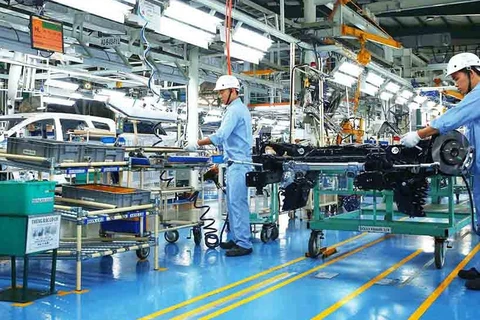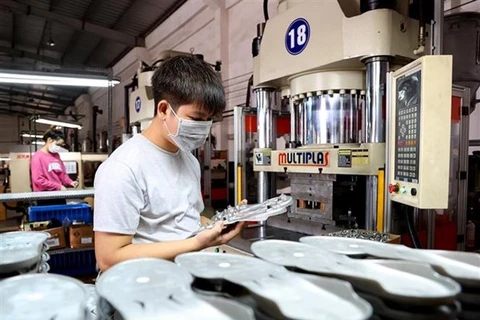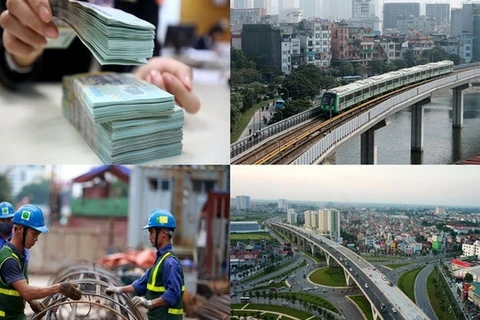Hanoi (VNA) – Despite headwinds, Vietnam has managed to show strong performance in the first nine months of this year, posting a gross domestic product (GDP) growth of 4.24%, said Deputy Minister of Planning and Investment Tran Quoc Phuong at a seminar in Hanoi on October 5.
The official held that growth promotion, macro-economic stability, strong disbursement of public investment capital and achievements in external relations are among spotlights of the Vietnamese economy so far this year, which create a driving force for the economic growth for the whole year.
Phan Duc Hieu, permanent member of the National Assembly (NA)’s Economic Committee, shared the view and highlighted the efforts made by the NA, Government, businesses and people.
He said that the NA and Government have issued many policies to support businesses and people, including tax reduction, exemption, and extension of financial obligations, which is worth about 150 trillion VND (6.14 billion USD).
Lauding Vietnam’s active policy response, Shantanu Chakraborty, Asian Development Bank (ADB)’s Country Director in Vietnam, said that the Vietnamese Government has moved in the right direction and in a timely manner.
Dr. Vu Minh Khuong, a lecturer from Lee Kuan Yew School of Public Policy of Singapore said that the US President’s visit to Vietnam has also brought about new motivations for new sectors, including semiconductor production, which is a good opportunity for Vietnam.
However, he noted that businesses are facing big problems, requiring transformation in production and business applications, such as green criteria in export products. Finding a new business model is also necessary, he stated.
In report released in September, the ADB predicted that Vietnam will continue to take the lead in Southeast Asia with growth of 5.8% in 2023, lower than that of last year but still a good figure. Chakraborty held that the goal of 6% in growth rate set by the Vietnamese Government is reachable.
Vietnam has shown a positive pace in investment and public spending, while the State Bank of Vietnam has well performed its role in controlling inflation, he said, underscoring that comparing to other regional countries, Vietnam has achieved encouraging achievements.
The official held that growth promotion, macro-economic stability, strong disbursement of public investment capital and achievements in external relations are among spotlights of the Vietnamese economy so far this year, which create a driving force for the economic growth for the whole year.
Phan Duc Hieu, permanent member of the National Assembly (NA)’s Economic Committee, shared the view and highlighted the efforts made by the NA, Government, businesses and people.
He said that the NA and Government have issued many policies to support businesses and people, including tax reduction, exemption, and extension of financial obligations, which is worth about 150 trillion VND (6.14 billion USD).
Lauding Vietnam’s active policy response, Shantanu Chakraborty, Asian Development Bank (ADB)’s Country Director in Vietnam, said that the Vietnamese Government has moved in the right direction and in a timely manner.
Dr. Vu Minh Khuong, a lecturer from Lee Kuan Yew School of Public Policy of Singapore said that the US President’s visit to Vietnam has also brought about new motivations for new sectors, including semiconductor production, which is a good opportunity for Vietnam.
However, he noted that businesses are facing big problems, requiring transformation in production and business applications, such as green criteria in export products. Finding a new business model is also necessary, he stated.
In report released in September, the ADB predicted that Vietnam will continue to take the lead in Southeast Asia with growth of 5.8% in 2023, lower than that of last year but still a good figure. Chakraborty held that the goal of 6% in growth rate set by the Vietnamese Government is reachable.
Vietnam has shown a positive pace in investment and public spending, while the State Bank of Vietnam has well performed its role in controlling inflation, he said, underscoring that comparing to other regional countries, Vietnam has achieved encouraging achievements.
The ADB Country Director emphasised that Vietnam can do even better, for example in public investment. The country can strengthen fiscal policies to promote domestic demands and encourage economic activities, while focusing more on private economy development, he advised.
Chakraborty and economic experts also advised Vietnam to mobilise more resources from the private sector for infrastructure development, promoting the domestic consumer market, creating favourable conditions for people to improve income, and at the same time speeding up public investment disbursement, flexibly managing fiscal and monetary policies, and restructuring the labour market./.
Chakraborty and economic experts also advised Vietnam to mobilise more resources from the private sector for infrastructure development, promoting the domestic consumer market, creating favourable conditions for people to improve income, and at the same time speeding up public investment disbursement, flexibly managing fiscal and monetary policies, and restructuring the labour market./.
VNA

























